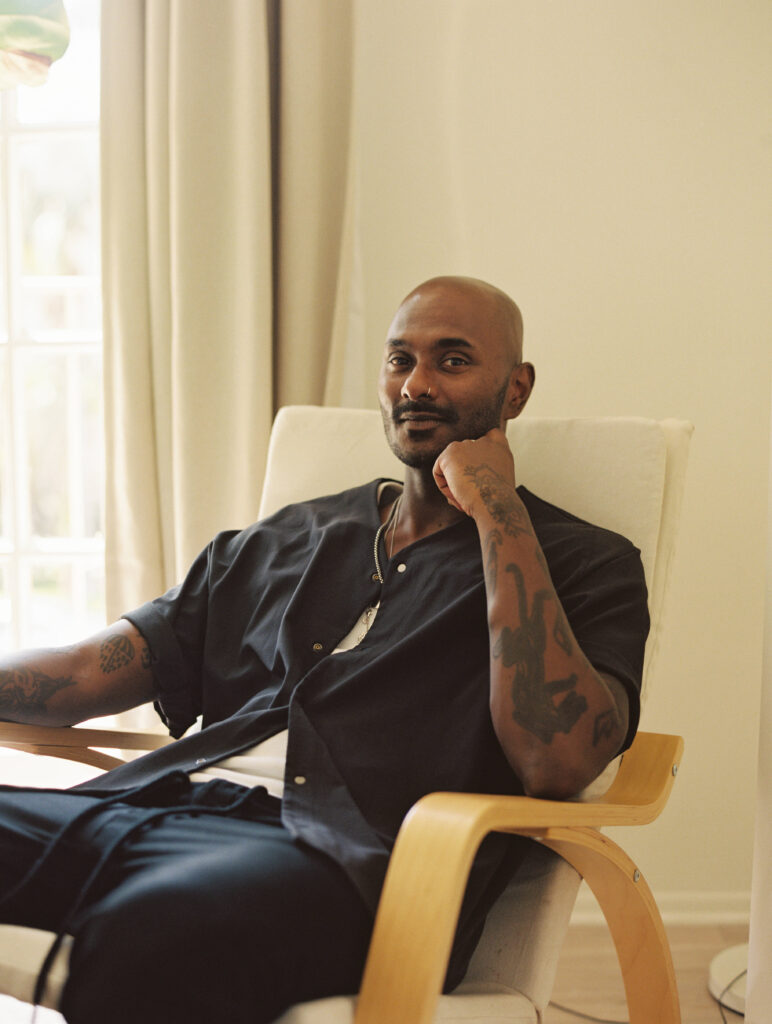IT’S A GROSS cliché, but you never forget your first match. I remember stepping into the simmering hum of a football stadium, seven years old, wearing my older brother’s oversized replica shirt and clutching a match-day program so tight the ink was almost staining my fingers.
The only other place I’d seen such a scrum of humanity in one place – people united in curious and vocal activism for a common cause – was in the pews at St Luke’s Church in Maidstone on a Sunday morning. The jury’s still out for me on religion, but I started to believe in something that day, 23 November 1991, when I went to watch Tottenham Hotspur play.
If you’re reading Men’s Health, and particularly this article, it’s likely that when you’re not too busy bench-pressing or training for your next Hyrox, you have at least a passing interest in sports. Given that football has 3.5 billion fans worldwide, it’s also not too far-fetched to presume you also support a team. You may not be the type of fan who ties their money, time and emotional wellbeing to the cosmically meaningless act of one team kicking a leather ball into a polypropylene net more times than the other, but many are. And I am one of them, with 35 years of following Spurs under my blue-and-white striped scarf.
Around two years ago, I worked out that I was spending around 25 hours per week watching, reading, listening to or typing into a smartphone app about football-related content. That amounts to more than a day every week, and around 54 days a year. I decided to go completely cold turkey on the beautiful game for six weeks. I wrote about the discombobulating experience for The Guardian, and it helped me to understand how I’d become hopelessly obsessed with football and disconnected from the sport’s greatest gift: community.
Ever since, questions about what it means to be a fan are never far from my mind. I’d go as far as to say that I was addicted to consuming football content, but addictions are normally to things like drugs and alcohol – can you really be addicted to something as vacuous as football? And how does my football fandom compare to obsessive fandom of other pursuits like politics or music? For me, it’s Tottenham, for others it’s Taylor Swift or the Tories, but ultimately, does it all amount to the same thing?
Your brain on fandom
Daniel Wann is a professor of psychology at Murray State University, Kentucky. In 2019, the sports website ESPN dubbed him ‘Dr Fandom’ on account of his decades-long study of the (dys)functional field of sports fans. He has previously noted how, ‘The craziest thing about sports fans is that there actually are sports fans. This has to be the only domain, the only voluntary activity where half the people know, literally, that they’re going to be upset when this thing that they consume voluntarily is over.’
In his book Sports Fans: The Psychology And Social Impact Of Sports Fandom, Dr Wann references The Psychological Continuum Model, devised by Daniel C Funk and Jeff James, which reduces fandom to four distinct stages: awareness, attraction, attachment and allegiance. I put myself firmly in stage four.
‘Once you get to attachment and allegiance, you’re probably locked in,’ says Dr Wann, down the line from his home in Kentucky. For some fans, Dr Wann says, supporting a team becomes a central part of their core identity – think men (and it’s usually men) who have a social media bio that mentions their favourite team. ‘Identification with a team is usually a lifelong love affair that fans take to their graves,’ Dr Wann writes. This isn’t necessarily a bad thing. His previous research has found positive effects of team identification, which are more pronounced when it’s a local club you’re allied to – largely through the social connections forged in the stands or on bar stools.
“Fandom can be reduced to four stages: awareness, attraction, attachment and allegiance”
‘We have a need to fit in but also a need to be unique. Sports fandom helps us meet these basic needs,’ Dr Wann says, adding that this could also be extrapolated out to other areas of interest, like admiring a particular band or political party. ‘We have an ideal self we strive for that allows us to feel like we fit in with a group, but we don’t want to be like sardines in a can,’ he adds.
However, his research suggests that there are downsides, too – and not always in the ways that you might think. Dr Wann argues that following a team can lead fans to behave in ways that seem antithetical to a rational mind. A 2011 study with fans of Major League Baseball found that 17% would wear the same underwear for a month if that meant their team would win the World Series, while 47% were willing to ‘at least minimally consider’ donating an organ. Whether you think this healthy or hapless possibly depends on your own level of team identification, but Dr Wann says, for a fan, ‘It’s like them saying, “Well, sure, I can finally act like I’m contributing, right?”’

Hi, I’m a football addict
‘Being addicted to football is the same as being addicted to anything else. Alcohol, drugs, shopping, sex, whatever,’ says Sally Baker, a London-based therapist who specialises in anxiety and compulsive behaviours. ‘They’re all replacements for areas of someone’s life that aren’t satisfying. It’s all about the dopamine release and the feel-good hormones that you get.’
When it came to giving up my football habit, I deleted football apps, left WhatsApp groups, unfollowed sports journalists on social media, unsubscribed from podcasts and gave my season ticket to my brother. I avoided pubs that showed football and texted anyone I was meeting in advance, asking them to, ‘Please, please, please avoid discussing football with me.’ There were downsides. Football is so interwoven into the fabric of my life that I missed birthday parties because I didn’t see WhatsApp messages. My dad and I had almost nothing to talk about. I also got off buses 12 stops early because school kids were talking about Manchester United. It was cold-turkey stuff.
‘In other areas of my life, I’m in charge. With Arsenal, it’s unpredictable. It’s out of my hands’
‘With addictive behaviour, there’s two things going on,’ says Baker. ‘You have the secondary gain of this 24-hour football content churn – and this is also stopping you from having to address the things in your life you aren’t completely happy with.’
As the weeks slipped by, I came to realise the driving force of my own particular weakness was the dopamine machine in my pocket – dinging 24 hours a day with new, never-quite-satisfying-enough content – which I’d got accustomed to during a mentally sticky and isolating pandemic period. I’d also just gone through a painful break-up.
‘Doomscrolling is definitely addictive. The algorithms and technologies are very sophisticated. They are designed by behavioural specialists to grab your attention and keep it there for as long as possible,’ Baker says. Combine this with my lifelong passion for football’s minutiae and I was permanently jonesing for another Tottenham long-read. ‘Your football doomscrolling is a thing of deep emotional interest. So, whereas some people might shop compulsively, watch porn or gamble, you’ve got your niche interest and there’s enough to set up an addictive behaviour.’
The agony and the ecstasy
Football fandom can be a force for good that brings people together, but there’s a darker side to fandom, too. Baker says she’s noticed more men need her help with gambling problems that have become ‘completely normalised’, while the sport’s links to anger and aggression are equally worrying. Statistics released by the UK football policing unit (UKFPU) revealed that in the 2023 to 2024 football season, there were 2,584 football-related arrests, a 14% increase on the 2022 to 2023 season.
Lee Judges, aka ‘The Judge’, will be well known to fans of football-related content. He has a YouTube channel called Lee Judges TV but is most famous for his regular role on Arsenal Fan TV (AFTV): the infamous YouTube fan channel with 1.71 million subscribers, started by Robbie Lyle in 2012. If you want to learn about obsessive fandom, he’s a very good person to talk to.
AFTV has become the exemplar for an outspoken type of online fan and is most renowned for its post-game interviews where presenters vent and spleen in the name of shareable content. Judges himself can seem devoured by rage when the camera’s on and, with his shiny head and cornea-popping stares, perhaps fulfils the stereotype of a certain type of fan you want to avoid on a dark night – especially if Arsenal have lost.
Before we meet, I get a tip-off that he’s a lovely bloke. We speak while Judges is waiting to do some recording at AFTV’s studios and, sure enough, I immediately like him.
‘Growing up, it would ruin my dad’s week if his team lost. I thought, I don’t want to be like that’
Judges became a regular on AFTV after randomly stopping by Lyle’s microphone outside Emirates Stadium following Arsenal’s 2-1 loss to Swansea in 2016. The era of their iconic manager Arsène Wenger was nearing its end and the fanbase was starting to sour. His ensuing impassioned rant went viral and I want to know if he has a read on why he instantly appealed.
‘I think about this a lot because you can be angry, or whatever, but I reckon it was the part where I said that Arsène Wenger is not prepared to overspend, but I overspend every game. That related to every fan because we’re all overspending, whether you’re a Spurs fan, Chelsea, United, whoever,’ Judges says, adding that lots of his viewers are fans of opposing teams who watch after an Arsenal defeat to ‘enjoy the misery of you losing’.
I tell Judges that, with my extremely narrow knowledge of his inner and exterior life, he seems like a happy-go-lucky guy and he agrees. So why is it that Arsenal’s performances prompt such visceral reactions from him?
‘It’s because in other areas of my life I’m in charge, you know what I mean? But with Arsenal, it’s unpredictable. It’s out of your hands. You know you’re going to the game and your life can be so much happier. But it’s not in your hands.’
While it’s not unknown for me to have a cry after Spurs, or England, lose a big final, I generally don’t carry losses around much after I’ve sunk the first post-match pint. But what about him?
‘When I was growing up, my dad was an Arsenal fan and it would ruin his week if they lost. As a kid seeing that, I thought, “I don’t really want to be like that.” So I try not to. If Arsenal lose and I have to go out, I will. There’s a lot of people that won’t, but I try to be a bit level-headed. I’m going to be a lot happier if they won than if they ain’t, but you wouldn’t know it.’
I ask Baker about the psychology of post-match rage. She says that letting it all hang out on AFTV (and other fan channels) ‘could be a healthy outlet of expression’, but also that ‘the underlying emotion of anger is always pain and hurt. And that’s where men generally don’t want to go because they can be derided for having these emotions’.

It’s not about wins and losses
Fandom might be a crucial part of sports, but it’s arguably just as big a component of following music. It’s impossible, for instance, to disentangle The Beatles from the screaming fans of Beatlemania during the 1960s or, latterly, Taylor Swift from her ‘Swifties’, who follow her with the same quasi-religious devotion that I do football.
‘Music fandom has always been about finding your people, but also about marking you out from others. It’s as much who you’re not as who you are, and within that, it’s a way to find like-minded people,’ says Stuart Stubbs, editor of the independent music publication Loud And Quiet and host of the Midnight Chats podcast. ‘Especially if you feel like an outsider, it’s a huge thing to discover a community through music and mutual love for an artist or a scene. As that happens, you just love the artist and scene more, as it becomes your identity but also something or someone you owe in some way.’
Another parallel is the growing similarities between sports-team fandom and that of supporting a political party or figure. Mike Devlin is a professor at Texas State University and an expert in mass communication – particularly within sports. We speak, serendipitously, the day after Donald Trump is inaugurated as American president. ‘It’s very obvious that we’ve now turned politics, certainly American politics, into a sporting event,’ Dr Devlin says. ‘It has become rooted in fan identification – where you want your team to win, no matter what. And you want the other side to lose, no matter what. People watched election night as if it was sports and it was framed that way in the media,’.
‘The goal is to protect your identity. It’s not just about wanting to win or lose’
He explains that, ‘The number-one thing highly identified fans have on their personality side is lower levels of modesty, which explains why they wear hats and jerseys displaying their team. And you also have low levels of prudence.’
The latter makes them prone to less rational decision-making and the two factors combined help explain why fans will still support a flagrantly cheating player on their team, or defend politicians acting in ways we previously deemed unacceptable. ‘The goal is to protect your identity. Especially if you’ve bought the red hat, and you’ve gone to the rallies. It’s not just wanting to win or lose – it’s wanting to make sure that you win unquestionably and, if you lose, there’s a reason why.’
He’s politically diplomatic but says it’s broadly Trump supporters who are engaging more in this sports-fan adjacent behaviour. With this in mind, I wonder what happens to Trumpism when the final whistle goes on its creator’s career. ‘History shows us that when a very strong person leaves – whether it’s sport or politics – it somewhat dies with them. The fandom that we see with American politics right now is not a fandom for Republican ideology. It really is a fandom for an identity with Trump, as he’s the front person,’ Dr Devlin says.
On the road to recovery
Since my own experience of footballing cold turkey, I get asked a lot whether I’ve ‘relapsed’ and the answer is… sort of. I’ve reduced that content intake – mainly through not re-downloading apps, an apathy towards social media that the six-week break helped induce and nixing some podcasts from my life. Being in a stable new relationship – with an Arsenal fan, for shame – helped. As did, to use non-therapeutic argot, ‘getting a bit of a grip’.
I’m also broadly less fraught about results and outcomes now, though I’d be intrigued (not to mention surprised) to see this hypothesis tested by Spurs challenging for major titles. Still, when I told Peter Millward, professor of sociology from Liverpool John Moores University, who has written widely on fandom and activism, about my ‘football sober’ experience, he laughed and said: ‘But you’re already hooked. Going cold turkey doesn’t stop you being hooked, does it?’ And he’s right. I’m a football – particularly Tottenham and England during tournaments – addict for life.
There’s been a curious coda to my little football fandom vignette. While researching the article you’re reading now, I found a YouTube video in which a softly spoken, bespectacled lad discussed his recent decision to quit his own footballing addiction. I DM’d him and he sweetly replied saying that my original feature was the inspiration – and that it has changed his life.
I called Jez – yet another Arsenal fan – shortly after Christmas. He said he’d been a ‘fanatic’ for whom the ‘Emirates [stadium] was a cathedral’, but he’d had enough of ‘the obsession, the talking about it, the arguing about it, the worrying about it, the nerves, the adrenaline’, and had cleared football out alongside a wider jettisoning of the toxicity in his life. Part of this was extricating himself from his parents, including his dad, whom he inherited his fandom from. He’d been four months away when we spoke and Jez says he doesn’t miss football, and all power to that. But, even after all the benefits I’ve found from giving up on obsessive fandom, part of me can’t help but hope he’ll find the way back to church one day.
Are you a sports addict?
The Psychological Continuum Model tracks the different stages of sports fandom – from childhood to old age
Awareness
This is simple: do you know a team exists? When you were a child, perhaps you knew your dad went to watch a match most Saturdays. You’ve never been, though, and frankly have got bigger fish to fry – starting with that new Lego set.
Attraction
You’re happy enough to sit and watch football, and are starting to develop an attachment to certain players. You inadvertently find yourself cheering at goals. The attraction phase is underway.
Attachment
Now you support them, albeit without the same intensity of some. You’re happy when they win, but by no means disconsolate when they lose.
Allegiance
You’ve decades of fandom behind you, your season ticket is your prized possession and the relationship with your team is ‘life’s greatest love affair, other than a multi-gym’. Are you an addict, though? Only if it starts negatively impacting other areas of your life, such as work, relationships or health.
This article originally appeared on Men’s Health UK.
Related:















